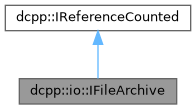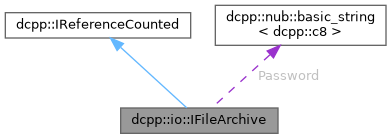 |
Duckcpp 2.1.0
Duckcpp is a high-performance c++ graphics engine.
|
 |
Duckcpp 2.1.0
Duckcpp is a high-performance c++ graphics engine.
|
The FileArchive manages archives and provides access to files inside them. More...
#include <duckcpp/core/engine/IFileArchive.hpp>


Public Member Functions | |
| virtual IReadFile * | createAndOpenFile (const path &filename)=0 |
| Opens a file based on its name. | |
| virtual IReadFile * | createAndOpenFile (dcpp::uint32_kt index)=0 |
| Opens a file based on its position in the file list. | |
| virtual const IFileList * | getFileList () const =0 |
| Returns the complete file tree. | |
| virtual E_FILE_ARCHIVE_TYPE | getType () const |
| get the archive type | |
| virtual const dcpp::io::path & | getArchiveName () const =0 |
| return the name (id) of the file Archive | |
 Public Member Functions inherited from dcpp::IReferenceCounted Public Member Functions inherited from dcpp::IReferenceCounted | |
| IReferenceCounted () | |
| Constructor. | |
| virtual | ~IReferenceCounted () |
| Destructor. | |
| void | grab () const |
| Grabs the object. Increments the reference counter by one. | |
| bool | drop () const |
| Drops the object. Decrements the reference counter by one. | |
| dcpp::int32_kt | getReferenceCount () const |
| Get the reference count. | |
| const dcpp::char_kt * | getDebugName () const |
| Returns the debug name of the object. | |
Public Attributes | |
| dcpp::nub::string | Password |
| An optionally used password string. | |
Additional Inherited Members | |
 Protected Member Functions inherited from dcpp::IReferenceCounted Protected Member Functions inherited from dcpp::IReferenceCounted | |
| void | setDebugName (const dcpp::char_kt *newName) |
| Sets the debug name of the object. | |
The FileArchive manages archives and provides access to files inside them.
Opens a file based on its name.
Creates and returns a new IReadFile for a file in the archive.
| filename | The file to open |
|
pure virtual |
Opens a file based on its position in the file list.
Creates and returns
| index | The zero based index of the file. |
|
pure virtual |
Returns the complete file tree.
| dcpp::nub::string dcpp::io::IFileArchive::Password |
An optionally used password string.
This variable is publicly accessible from the interface in order to avoid single access patterns to this place, and hence allow some more obscurity.